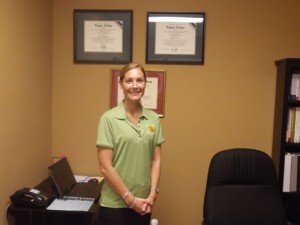
BERLIN — For most kids, going back to school after summer vacation can be tough. For those with learning disabilities, anxiety or a host of other common adolescent problems, the experience can be downright intimidating, which is why Worcester Youth and Family Counseling Services (WYFCS) has staff members like Dr. Jen Leggore on hand to help ease that transition for families.
“This is typically a really busy time of the year … I got a lot of phone calls prior to school starting,” she said.
Leggore called the period in late-summer when most children return to school a “huge stresser for a lot of families.”
The most common issues Leggore has come across are students with ADHD, general anxiety, forms of autism and Asperger syndrome, and students who have or have fears about bullying. While most of these can present problems throughout the school year and into the summer, Leggore explained that the first few weeks before and after students head back to class can be the period when the situation can become the most extreme.
“School is definitely a big stresser and trigger … I saw a lot of anxiety in preparation for school,” she said.
The scramble to acclimate in a new environment, including finding new classes, learning a new schedule or becoming familiar with a new building, is stressful on its own and can become overwhelming when coupled with a pre-existing condition like ADHD, according to Leggore.
Luckily, through WYFCS and the school system, a number of programs are in place to help the entire family.
Because WYFCS has such a strong partnership with area schools, Leggore and her colleagues are able to work with teachers, administrators and guidance counselors around the county with training and group workshops, as well as individual therapy sessions with students.
“We can go to the school,” she said.
In the field of youth counseling for 13 years, Leggore said that she has noticed a number of patterns in that time that should give parents a heads up about potential trouble on the horizon. One thing that can dramatically affect vulnerable students, she continued, is a huge shift in schedule.
“Kids really respond well to structure,” she said.
While making the transition from one grade to the next can trigger this anxiety over scheduling, jumping from one school to another is usually what most exacerbates the problem.
“[Going to] high school is the worst,” noted Leggore, “middle [school] to high.”
Even in cases when a child might not have any medical conditions, Leggore pointed out that things like bullying and general anxiety can be crippling for any student struggling during their first weeks back. In order to ease that stress, she suggested that support start with the family.
“Kids love the idea of having something to work toward,” said Leggore.
She advised parents to try a “work first, and then play” strategy in regards to things like homework or studying. Additionally, instead of threatening a student with punishment, if they don’t want to work, attempt to engage them by offering an incentive.
If problems persist to the point the family needs help, Leggore urged parents to work with either their school or WYFCS to set up professional assistance for their child. Counselors are trained to help kids deal with any anxieties that coming back to school may bring to the surface.
Leggore underlined the numerous anti-bullying groups that have been in place for years, as well as others that focus on young girls like SAGES, children looking for extracurricular activities like the Berlin Youth Club, and a new program in the works this year called “Rollercoaster”, which will revolve around helping kids cope with their parent’s divorce.
For more information on youth programs in the community, contact WYFCS at 410-641-4598 or go online to www.gowoyo.org.
